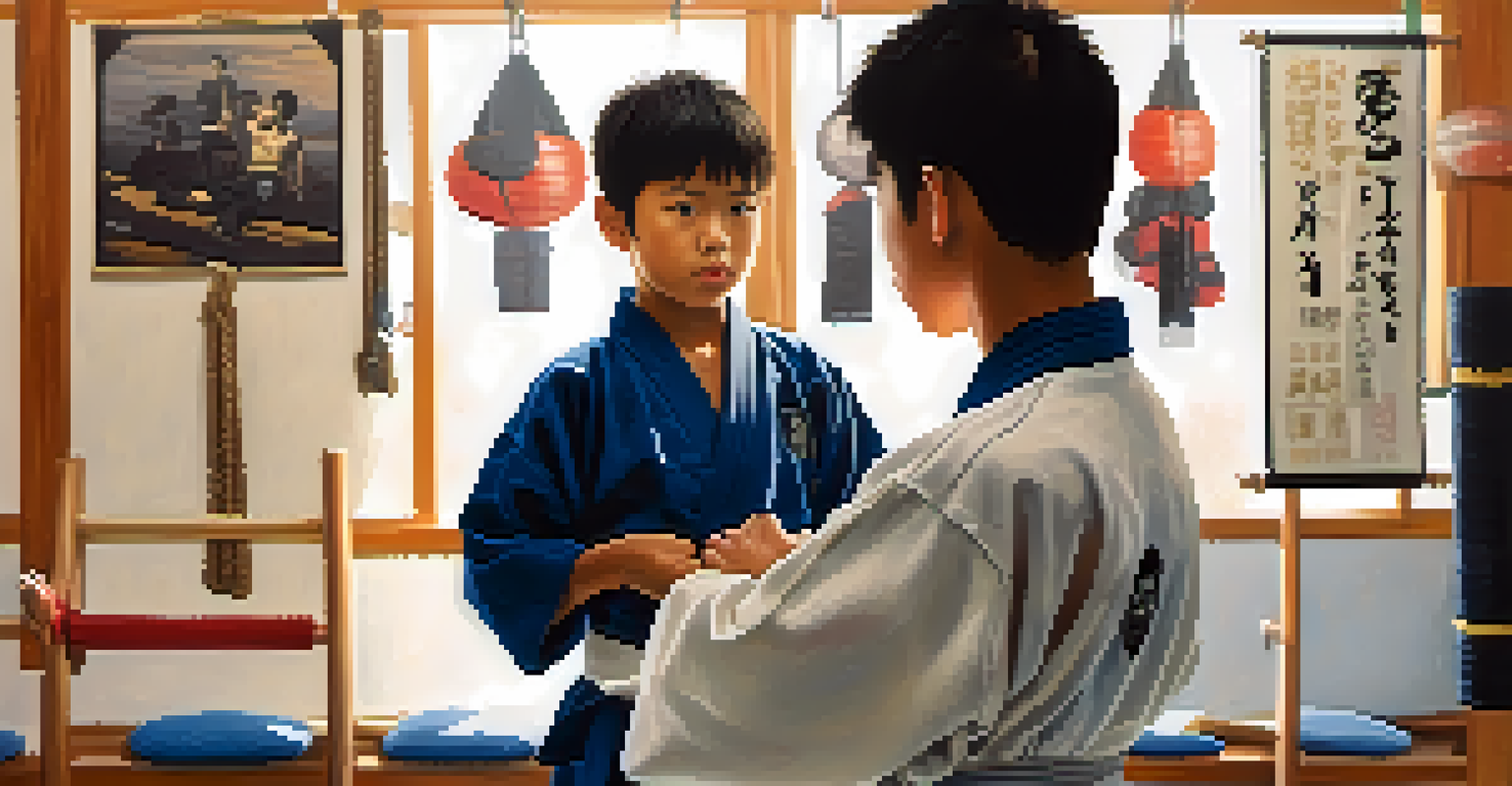Integrating Martial Arts into Resilience Programs for Teens

Understanding Resilience and Its Importance for Teens
Resilience is the ability to bounce back from challenges and setbacks, a crucial skill for teens navigating life's tumultuous waters. During adolescence, young people face numerous pressures, from academic stress to social dynamics, making resilience more important than ever. Developing this trait can help them cope with difficulties and emerge stronger, laying a solid foundation for adulthood.
It’s not whether you get knocked down, it’s whether you get up.
Incorporating resilience training into programs for teens can provide them with tools to handle adversity effectively. This training often involves teaching them how to manage emotions, set realistic goals, and develop problem-solving skills. With these capabilities, they can face challenges head-on rather than avoiding them.
Martial arts offer a unique avenue for building resilience, as they combine physical activity with mental discipline. As teens learn various techniques and strategies in martial arts, they also cultivate a mindset of perseverance, making them more equipped to deal with life’s ups and downs.
Key Benefits of Martial Arts for Teen Resilience
Martial arts provide a structured environment where teens can learn the value of hard work and dedication. As they practice regularly, they not only improve their physical skills but also develop a sense of achievement that boosts their self-esteem. This newfound confidence can significantly impact how they handle stress and adversity in everyday life.

The discipline required in martial arts training teaches teens the importance of focus and commitment. Just as they must concentrate to master a new technique, they also learn to apply this focus to their academic and personal challenges. This transfer of skills can make a noticeable difference in their resilience.
Resilience Helps Teens Thrive
Developing resilience equips teens with essential skills to navigate life's challenges and emerge stronger.
Moreover, martial arts often foster a supportive community, which is essential for teens. Being part of a group where they can share experiences and encouragement helps them feel connected and understood, reducing feelings of isolation. This camaraderie reinforces their resilience as they navigate the challenges of adolescence together.
How Martial Arts Develop Mental Toughness
Mental toughness is a key component of resilience, and martial arts training is inherently designed to build this quality. Teens are frequently pushed out of their comfort zones, whether through sparring or challenging drills, which helps them learn to manage discomfort and fear. This experience is invaluable when facing real-life challenges outside the dojo.
The greatest glory in living lies not in never falling, but in rising every time we fall.
As they encounter and overcome physical challenges in martial arts, teens also learn to embrace failure as a part of the growth process. Each time they fall or lose a match, they are encouraged to get back up and try again, instilling a powerful message about perseverance. This mindset can be transformative when they face setbacks in academics or personal relationships.
Additionally, martial arts practice often requires setting goals, whether it's achieving a new belt rank or mastering a specific technique. This goal-setting process helps teens understand the importance of patience and persistence, reinforcing the idea that resilience is not just about bouncing back, but also about moving forward.
Incorporating Martial Arts into Resilience Programs
To effectively integrate martial arts into resilience programs for teens, organizations can partner with local martial arts schools and instructors. These partnerships can provide professional guidance and resources to ensure the program is well-structured and impactful. By incorporating expert knowledge, the program can address various aspects of resilience training.
Programs can be designed to include both physical training and discussions around resilience-building concepts. For instance, after a martial arts session, facilitators can lead a discussion on how the lessons learned during training apply to everyday life. This reflection helps reinforce the skills and concepts, making them more relatable and applicable.
Martial Arts Build Confidence
Participating in martial arts fosters a sense of achievement, boosting teens' self-esteem and resilience.
Moreover, incorporating various martial arts styles can appeal to a diverse group of teens, allowing them to find a discipline that resonates with them. Whether it's karate, judo, or taekwondo, this variety can enhance engagement and motivation, ensuring the program remains dynamic and relevant.
Real-Life Success Stories: Teens Thriving Through Martial Arts
There are numerous inspiring stories of teens who have transformed their lives through martial arts. For example, a young girl struggling with anxiety discovered a newfound sense of confidence after joining a local karate class. The skills she learned not only helped her in the dojo but also allowed her to face social situations with greater ease.
Another teen, who faced bullying in school, found empowerment through jiu-jitsu. By learning self-defense techniques, he gained not only physical strength but also the mental resilience to stand up for himself. This journey illustrates how martial arts can be a powerful tool for personal growth and self-advocacy.
These success stories highlight the profound impact martial arts can have in fostering resilience. They serve as reminders that, with the right support and training, teens can overcome challenges and build a brighter future.
Creating a Supportive Environment for Teens
A supportive environment is crucial for fostering resilience in teens, and martial arts classes often provide just that. Instructors typically emphasize respect, teamwork, and personal growth, creating a culture where everyone is encouraged to succeed. This positive atmosphere can help teens feel safe while they navigate their emotional and physical challenges.
Encouraging parental involvement can also enhance the effectiveness of resilience programs. Parents who understand the benefits of martial arts can reinforce the lessons learned in class at home. This alignment between home and training can create a consistent message, making resilience skills more likely to stick.
Supportive Communities Matter
Creating a positive environment in martial arts classes encourages teamwork and personal growth, enhancing resilience.
Additionally, celebrating achievements, no matter how small, is vital for building confidence. Whether it’s a new belt or mastering a challenging technique, acknowledging these milestones fosters a sense of accomplishment. This recognition not only motivates teens but also reinforces the idea that effort and resilience lead to success.
Next Steps: Implementing Martial Arts in Your Community
If you're interested in integrating martial arts into resilience programs for teens in your community, start by assessing local resources. Research nearby martial arts schools and reach out to instructors who may be eager to collaborate. A partnership can create opportunities for teens that might not currently exist.
Consider organizing workshops or introductory classes to gauge interest among teens and their parents. These sessions can serve as a springboard for longer-term programs, allowing participants to experience the benefits of martial arts firsthand. Gathering feedback from these initial offerings can help tailor future programming to meet the community's needs.

Lastly, don’t underestimate the power of community support. Engaging local businesses, schools, and community organizations can help raise awareness and resources for these resilience programs. Together, you can create a robust network that empowers teens through martial arts and equips them with essential life skills.